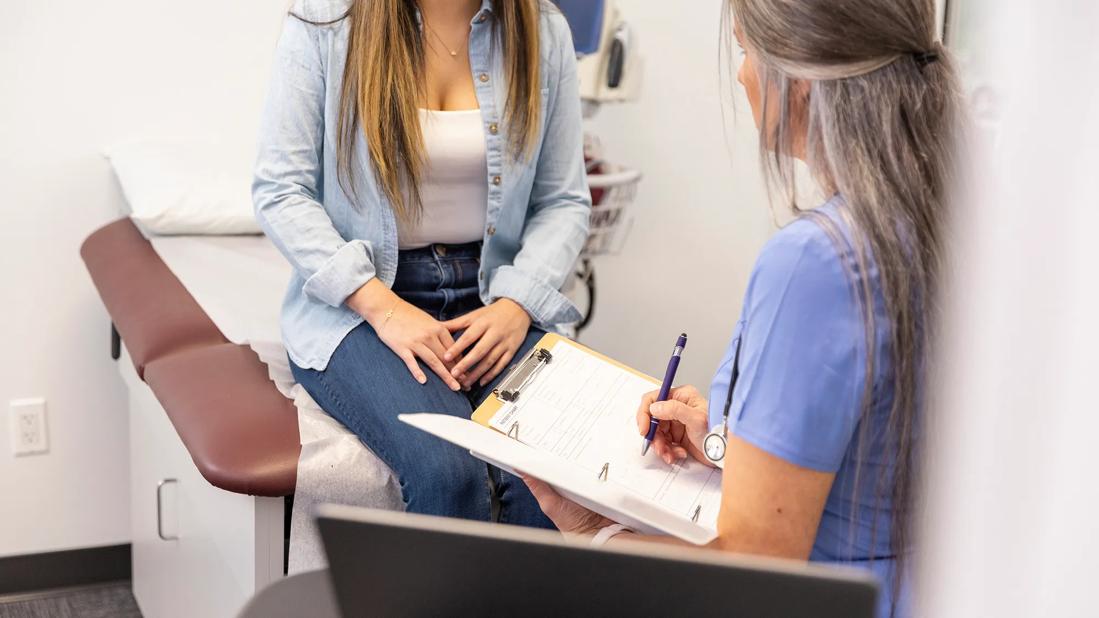A second opinion can confirm your diagnosis and treatment plan and help you feel more confident about what’s next

Image content: This image is available to view online.
View image online (https://assets.clevelandclinic.org/transform/eefe9b50-3c2a-480e-9b6b-597e222135f5/doc-patient-appointment-2099568900)
Female patient sitting on exam table discussing health with healthcare provider
When you receive a breast cancer diagnosis, it’s natural to have a lot of questions — including, “Should I get a second opinion?” The answer, says oncologist Megan Kruse, MD, is often a resounding “Yes.” Here’s why.
Advertisement
Cleveland Clinic is a non-profit academic medical center. Advertising on our site helps support our mission. We do not endorse non-Cleveland Clinic products or services. Policy
When you have breast cancer, getting a second opinion can:
It’s best to seek a second opinion as soon as possible after your diagnosis — ideally, before you start any type of treatment. And while you don’t need any special reason or excuse to get a second opinion, it may be especially insightful if you:
Advertisement
Sometimes, it can take a bit of time to set up a second-opinion appointment. If you’re worried that this could delay the start of your treatment, talk to your healthcare provider to see what they recommend.
“You’ll want to get the names of several doctors and hospitals that have the most experience in treating breast cancer and are familiar with the latest updates on treatments,” Dr. Kruse advises.
Be sure to bring all of your medical records, imaging and pathology slides from the other hospital to your second-opinion appointment (or have them ready if you’re attending a virtual appointment).
Before your appointment, write down a list of questions to ask about your breast cancer diagnosis, like:
After your second-opinion appointment, speak with your original doctor to discuss what you’ve learned and how, if anything, it might change your treatment plan. If the two doctors’ views are very different, they may have to speak with one another to try to come to an agreement.
Oh, and one more thing: Seeking a second opinion doesn’t necessarily mean you have to switch doctors. You may decide you do want to do that — like if your current provider doesn’t specialize in the treatment you need — but it’s not usually the goal.
“Getting a second opinion can be an opportunity to meet with another doctor who can provide a second set of eyes about your diagnosis and treatment plan,” Dr. Kruse reiterates. “This does not mean you have to switch providers. Most of the time, second opinions reassure patients that they’re on the right track and should have confidence in their local doctor or team.”
Advertisement
Though you may feel uncomfortable asking your initial doctor for a second opinion, try not to be daunted.
“Your doctor shouldn’t take offense to you asking about a second opinion,” Dr. Kruse says. “It’s very common and even encouraged. As doctors, we often feel reassured by the input of colleagues — but if you really don’t want your second-opinion doctor to share their thoughts with your initial physician, that’s OK, too. The opinion can be for you only.”
Ultimately, getting a second opinion can help you feel more confident about your care options and decisions — so you feel as prepared as possible to face your breast cancer diagnosis.
Advertisement

Sign up for our Health Essentials emails for expert guidance on nutrition, fitness, sleep, skin care and more.
Learn more about our editorial process.
Advertisement
Research consistently shows that soy-based foods do not increase your risk of breast cancer
Breast cancer’s growth rate depends on its type, stage, grade and more
Breast cancer typically spreads to your lymph nodes first, and can travel to your lungs, bones and more
Many breast cancer survivors have babies — talk to your provider before treatment to understand all of your options
HER2-low is less aggressive than HER2-positive and HER2-negative, but the new designation allows for targeted therapies that may be helpful
Taking care of yourself extends beyond symptom management and includes things like passion projects and meaningful moments
Support groups, financial assistance and survivorship programs are all readily available
It depends on factors like the stage of the cancer, your age and other risks
Although it could be used as a moisturizer, this new trend is not recommended
Communicating clear limits helps protect your time, energy and emotional well-being
High cholesterol can be genetic, but testing and treatment can lower your heart disease risk